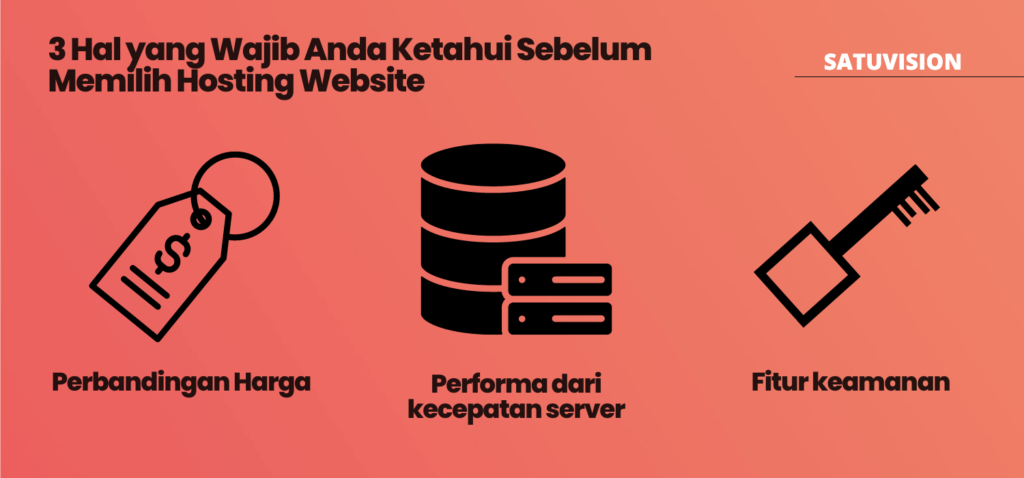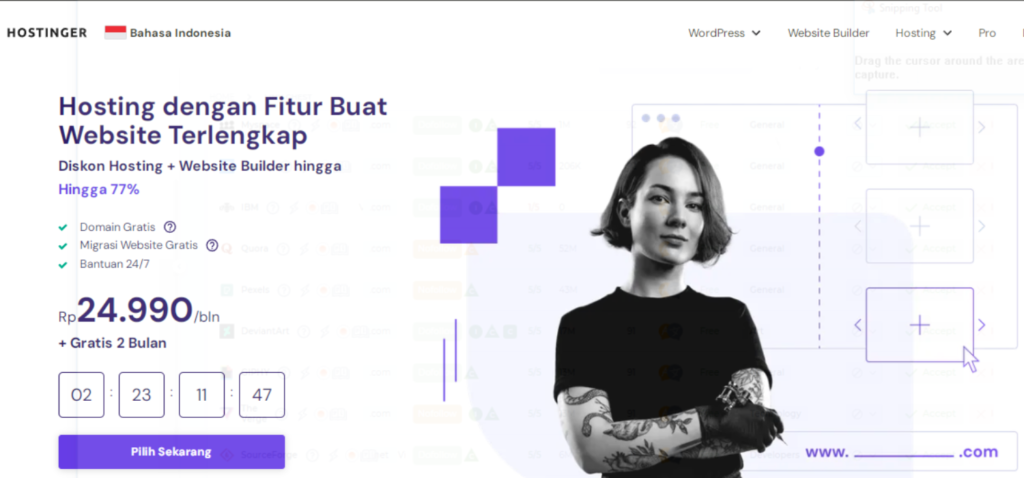10 Tips on How to choose a web hosting provider
The website serves as the main gateway for your customers to welcome those interested in the products you offer. That’s why having a website with excellent performance is crucial.
Therefore, choosing hosting for your business website is crucial. Selecting the right hosting is important to provide a satisfying user experience, build a positive reputation, and generate significant ROI for your business.
Imagine someone visiting your business website, only to find that it’s inactive or performing poorly due to sluggish server performance.
Doesn’t this hinder the management of your business instead?
To ensure your website performs well, selecting reliable web hosting is crucial. Here are some tips for choosing hosting for your business or personal website:
List of The Content
Why is Choosing the Right Web Hosting So Important?
Martin Heede, a former employee of Adobe, in his opinion on the reasons many businesses fail in executing their digital marketing efforts, conveyed,
“I believe the simple answer lies in the lack of understanding of implementing and sustaining digital strategies effectively.”
Then, does choosing website hosting affect that?
Absolutely! Hosting is one of the crucial pillars in building a strong foundation for digital marketing. Hosting plays a significant role in ensuring user comfort and determining your business’s reputation, which has the potential to generate profitable ROI.
Therefore, choosing a strong foundation is crucial.
Before discussing tips for choosing hosting for a website, here are some common types of hosting used:
- Shared Hosting: This is the most economical hosting option, where multiple users share one server. Although cost-effective, server performance can be affected by other users’ activities on the same server.
- VPS Hosting (Virtual Private Server): Although users still share one server, each gets a virtual partition that operates like an independent server in this type of hosting. This provides greater control and performance stability, but it is more expensive than shared hosting.
- Dedicated Hosting: Dedicated hosting offers a dedicated server to one user, providing maximum control and superior performance. However, it comes with high costs and requires deeper technical knowledge for management.
- Cloud Hosting: Cloud hosting utilizes resources from multiple servers connected in one network (cloud). It offers scalability and high availability, but costs can vary depending on resource usage.
- Managed Hosting: Managed hosting is a service where the hosting provider provides server space and manages the server. This reduces the technical burden for website owners, but it comes at a higher cost.
- WordPress Hosting: This hosting is specifically designed for websites using WordPress as their CMS. It allows for specialized optimization for WordPress, but is limited in flexibility for other platforms and may have higher costs compared to shared hosting.
Choosing the appropriate hosting type depends on various factors such as the size and type of the website, budget, and specific technical requirements, which will be further discussed in the next section of this blog.
3 Essential Things You Should Know Before Choosing Website Hosting

The hosting you choose should align with the needs of your website. Additionally, you also need to consider the level of reliability, performance, security, and support services from your web hosting provider.
These are all ways to ensure that your website performs well.
Of course, you wouldn’t want visitors to your website to be disappointed with slow and unresponsive performance.
Here are 3 essential factors to consider when choosing a web hosting service:
Price Comparison
Before choosing hosting for your website, you must know the hosting price. The cost of the service and fees should be a significant consideration, but don’t be immediately drawn to prices that are too low. Low prices may come with lower quality, for example, by sacrificing server speed performance or security levels. Therefore, what can be done is to compare the price of one hosting with another while looking at the advantages and disadvantages of each.
Server Speed Performance
One crucial aspect to understand before choosing a hosting for your website is the server speed performance. A good server performance ensures the website can be accessed and functions smoothly. Additionally, optimal performance provides visitors with a seamless and uninterrupted browsing experience on your website.
In general, an ideal website should load in less than 3 seconds. Why is faster better? Faster loading speeds can enhance user experience, increase visitor retention rates, and even impact your website’s SEO ranking.
Security Features
Understanding and knowing security features is crucial when choosing hosting for your business or personal website. You can ensure that your website hosting has robust protection layers, such as malware protection, DDoS protection, SSL, or encryption.
Understanding the level of security is the first step towards mitigation in case of unwanted events. That’s why it’s important to know the security features of your hosting service provider.
Here are 10 Tips on How to choose a web hosting provider
After understanding what needs to be known before choosing hosting for your business website, next, here are ten tips for selecting the right website hosting that suits your needs.
1. Understand Your Website Needs
The first thing you should determine is the type and purpose of your website. Identifying the needs and goals of the website is useful for determining the right hosting for it. There are various types of hosting with features that suit different needs.
For example, hosting a blog website may require different features compared to an online store.
The Satuvision Web Development team offers comprehensive services to determine your website needs and ensure your website operates optimally to support your business goals. Services offered include Paid Website Audit, Website Optimization, Website Maintenance, Website Development, and Website Design (UX/UI).
2. Research and Compare Hosting Providers
You should be meticulous before choosing a hosting provider. Compare the core services of each provider to find the one that best suits and meets your website’s needs.
Here are some tips from us to help you compare each hosting provider:
- Checking reviews, look for testimonials on trusted platforms, such as HostAdvice and Trustpilot, to get an initial overview of the hosting you are considering.
- Look for money-back guarantees or free trial options. This allows you to try out the web hosting service without risk.
- Contact customer service. You can ensure that the hosting provider has responsive customer service that quickly addresses user issues.
3. Check Key Features
Find out and understand what is offered in the key features provided. Choose website hosting that has adequate key features.
At the very least, the hosting you choose should include some common essential features such as:
- Migration Options: This feature is useful if you switch hosting providers. For example, Hostinger offers a free and easy website migration service.
- Domain Name Creation Option: One crucial element of a website is its domain name. Check if your hosting provider offers domain name registration and hosting services to streamline the website creation process and choose the right domain name for your website.
- Email: Custom email is an excellent additional feature for business websites and online stores as it can enhance credibility.
4. Choose One with Specialized Support
Choose a web hosting provider that offers 24/7 support. This ensures that you can get assistance immediately if an issue arises. Additionally, it’s important to ensure customer service responsiveness for easier communication.
5. The Right Hosting Package
Get a package that suits hosting your website. Consider the resources needed, such as storage and bandwidth, and the scalability of web hosting.
For example, hosting service providers like Hostinger offer 3 packages you can choose from: Premium package, Business package, and Cloud Startup package. Each package has its advantages and disadvantages, but you can customize them according to your needs.
6. Know the Types of Servers
One thing you must know before choosing hosting is understanding the types of servers. There are several types of servers, such as shared, VPS, dedicated, and cloud hosting. Furthermore, you should also understand the advantages and disadvantages of each server.
7. Consider Software Compatibility
If your website requires specific software, such as content management systems or programming languages, make sure the hosting provider supports these technologies.
For example, if your website uses WordPress as the content management system (CMS), you must ensure the hosting provider supports PHP and MySQL, which are requirements for running WordPress.
Furthermore, if your website requires specific frameworks like Laravel or Django, you need to check if the hosting provider supports the programming languages used in those frameworks.
By ensuring that your hosting provider supports the necessary technologies for your website, you can ensure that your website will run smoothly and meet your needs.
Read More: Is SSL a Necessity for Websites?
8. Evaluate Your Website Traffic and Scalability
The next crucial thing to consider is determining the estimated traffic volume to your website. This traffic volume can then be assessed to see if the hosting provider can accommodate the growth of visitors.
9. Free Trials
Having time to conduct a free trial with the hosting provider you intend to use is a plus point. Many web hosting services offer free trial periods for users. This is aimed at testing the provider and identifying potential obstacles.
10. Discover Additional Benefits
Before choosing hosting for a website, one thing to consider is to look for those offering additional benefits. Typically, hosting service providers offer extra benefits to be more competitive.
Read also: CThe Best Ways to Get Website Traffic for Your Business
Finding the Perfect Hosting for Your Website (Our Review)

Before deciding on the hosting for our SATUVISION website, we conducted a thorough assessment of our website’s needs. Our primary consideration was ensuring that the hosting provider offers a CMS system that utilizes WordPress, confirming support for PHP and MySQL.
In addition, we also require a hosting service provider that offers a domain checking tool. This facilitates the swift identification of the best available domain that can be readily used
We also require a hosting provider that offers free domain registration, website migration without any charges, and round-the-clock customer support that is always ready to assist. Additionally, we need a Website Builder feature that enables us to launch our website quickly and effortlessly.
With the considerations outlined above, our choice of hosting provider is Hostinger. Hostinger offers us the convenience of managing hosting, domain names, and SSL certificates all in one place, greatly simplifying our operations.
Hostinger also provides ease in managing professional business emails and optimizing workflows through their managed WordPress hosting.
Moreover, the website setup process runs smoothly without requiring assistance from customer support. However, their customer service is truly dependable if we have any questions. This further solidifies our decision that Hostinger is the right choice for our company’s hosting needs.
Conclusion
Choosing the right hosting for your business or personal website ensures its smoothness and success. Many tips for selecting hosting for a website can be considered when determining which hosting to use. These include comparing prices, assessing server speed performance, and checking security features, all leading to one goal: choosing a reliable hosting service that supports optimal website performance.
FAQ
Web hosting is a service that stores your website or web application and facilitates its access through various devices such as computers, phones, and tablets.
A hosting company provides server space to store all assets and data from a website. When someone enters the website’s domain name into a browser, the host sends all the necessary files for the user to access the site.
Want to develop an impressive website with excellent performance for your business? Click now, and let’s start creating a website that not only looks visually appealing but also maximizes your business potential.
If you’re also considering hosting your website with Hostinger, leverage our referral code for special offers at Hostinger!





